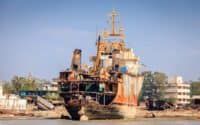The Vital Role of Crew Mental Health in Maritime Success.

Physical Demands: More Than Meets the Eye
- Long Hours: A ship never stops. Seafarers often work long shifts, sometimes stretching beyond the typical 8-hour workday. The continuous nature of shipping operations means crew members often operate on minimal sleep, especially during critical navigation periods.
- Manual Labor: The tasks onboard require more than just navigational skills. Loading and unloading cargo, maintenance, and other manual tasks demand significant physical effort, often in challenging conditions.
- Exposure to Elements: Whether it’s the blazing sun of the equator or the biting cold of polar waters, seafarers face it head-on. The sea’s unpredictability means they’re also at the mercy of storms, rains, and rough waters, all of which take a toll on their physical health.
* Please send feedback/suggestions to editor @ shipuniverse.com
Navigating Mental Stresses: The Invisible Battles
- Isolation: Months at sea means months away from familiar faces. The vastness of the ocean can sometimes amplify feelings of loneliness and isolation, especially when land is just a distant memory.
- Family Ties: Being away from families, missing significant life events, birthdays, anniversaries, and more can weigh heavily on a seafarer’s mind. It’s not just about physical distance but also the emotional gap that grows with time.
- Limited Social Interactions: While crew members form bonds, the limited number of people onboard means fewer social interactions. The lack of new faces or conversations can add to the monotony.
- Sea’s Monotony: Beyond the storms and occasional ports, the sea offers a consistent view — the horizon. Days can blend into each other, leading to a sense of timelessness and repetition, impacting mental stimulation.
Ripples in Wellbeing: The Cumulative Impact
The combination of physical demands and mental stresses results in a unique set of challenges for seafarers. Over time, these can lead to chronic health issues, both physical and psychological. Sleep disorders, musculoskeletal problems, depression, and anxiety are just a few issues that seafarers might face. Addressing the wellbeing of crew members isn’t just a matter of health; it’s crucial for the efficiency and safety of maritime operations. Recognizing these challenges is the first step toward ensuring a healthier, happier life onboard.
Anchoring Health: The Vitality of Onboard Medical Checks and Facilities
When at sea, a minor health issue can quickly escalate into a major concern due to the isolation from advanced medical facilities. Regular health checks play a pivotal role in the early detection and management of potential health concerns. Many modern vessels are equipped with telemedicine capabilities, ensuring a connection to medical professionals even while on open waters. Having an onboard infirmary with essential medical supplies and trained personnel is not just a regulatory requirement but a lifeline in the vast ocean.
Fueling the Voyage: The Essence of Nutrition and Diet
While the adventure of the open sea offers many enriching experiences, it also comes with its set of challenges, notably ensuring a consistent supply of fresh and nutritious food.
- Quality Over Quantity: It’s essential to ensure that the food onboard isn’t just about filling bellies but nourishing bodies. High-quality ingredients can make a difference in the overall health and morale of the crew.
- Tailored Nutrition: Different crew members might have varying nutritional needs, depending on their roles and physical demands. A deckhand might have different caloric needs compared to a navigation officer. Understanding and catering to these differences ensures each crew member gets what they need to stay energized and healthy.
The Rhythm of the Sea: Rest, Shifts, and Preventing Burnouts
The ceaseless nature of the sea means that ships operate round the clock. But the human body isn’t built for non-stop work.
- Structured Shifts: Implementing and sticking to structured shifts ensures that every crew member gets adequate rest. It’s not just about hours off-duty but ensuring those hours are consistent and, as much as possible, align with the body’s natural circadian rhythms.
- Rest and Recuperation: Beyond sleep, relaxation is essential. Designated rest areas, comfortable sleeping quarters, and even recreational activities can significantly impact the physical wellbeing of crew members.
- Monitoring Workloads: Automated tools and monitoring systems can keep an eye on the hours logged by each crew member, ensuring they aren’t overworked and get the necessary breaks.
Ready for the Unexpected: Training and Drills
The unpredictable nature of the sea means that emergencies can arise without warning. Whether it’s a potential fire, a medical emergency, or a man-overboard situation, preparedness is crucial.
- Regular Drills: Conducting regular drills ensures that every crew member knows their role in emergencies. It’s not just about knowing the procedures but executing them seamlessly when seconds count.
- Physical Readiness: Some emergencies might require physical exertion, be it firefighting or assisting injured crew members. Regular physical training sessions can ensure crew members are ready to handle such situations, minimizing injuries and ensuring quicker response times.
By placing emphasis on these aspects of physical health, shipping operations can ensure not only the safety and wellbeing of their crew but also the efficiency and success of their voyages.
Breaking the Waves of Stigma: Mental Health in Maritime Professions
For ages, the image of a seafarer has been that of a rugged individual, able to withstand the pressures of the sea both physically and mentally. However, beneath this stoic facade often lies a web of unaddressed emotional and psychological challenges. Recognizing and addressing mental health isn’t a sign of weakness but of strength and resilience. By fostering an environment where crew members feel safe discussing their feelings and concerns, the maritime industry can take a significant step in shattering the age-old stigmas.
An Oasis in the Ocean: Counseling and Support at Sea
Being isolated in the middle of the ocean doesn’t mean one should feel isolated mentally. Advances in technology and satellite communications have made it feasible to provide counseling services even in the deep seas.
- Tele-counseling: Dedicated helplines and video chat sessions with mental health professionals can offer a lifeline to those struggling with emotional and psychological challenges while onboard.
- Peer Support Systems: Training certain crew members in basic counseling techniques can offer immediate support during crises. These peer counselors can act as the first line of defense, providing comfort and guidance while ensuring that professional help is sought when needed.
Navigating Monotony: Activities and Morale Boosters
Days at sea can blend into one another, creating a sense of monotony. Introducing a variety of activities can make a significant difference.
- Recreational Spaces: Allocating areas for recreational activities, whether it’s a reading nook with a library of books or a gaming corner, can provide much-needed relaxation.
- Onboard Events: Celebrating birthdays, national holidays, or even organizing talent shows can break the routine and bring the crew together.
- Skill Development: Workshops or courses related to hobbies like photography, music, or even topics like financial management can provide both distraction and personal growth opportunities.
An Anchor to the World: Staying Connecte
One of the most significant challenges of being at sea is the distance from loved ones. Ensuring regular communication channels can ease feelings of homesickness and isolation.
- Satellite Communications: Most modern ships are equipped with satellite communication systems, allowing crew members to video call or message their families.
- Regular Updates: Keeping the crew informed about world events, sports scores, or even popular culture can make them feel connected to the world, even while in the middle of the ocean.
Sailing Towards a Brighter Future: The Impact of Mental Wellbeing
Prioritizing the mental health of seafarers isn’t just altruistic; it makes business sense. Crew members who feel mentally balanced are more likely to stay in their roles longer, reducing recruitment and training costs. Furthermore, they tend to be more efficient, making fewer mistakes, and fostering a positive onboard environment. The ripple effects of prioritizing mental health can lead to safer voyages, better operational efficiency, and a positive reputation in the maritime industry.
By shining a light on the often overlooked area of mental health, the maritime industry can ensure a brighter, healthier future for all its seafarers.

Do you have a Maritime Product or Service that may be of interest to Shipowners? Tell us about it here!
Do you have feedback or insights? Please reach out to editor @ shipuniverse.com



